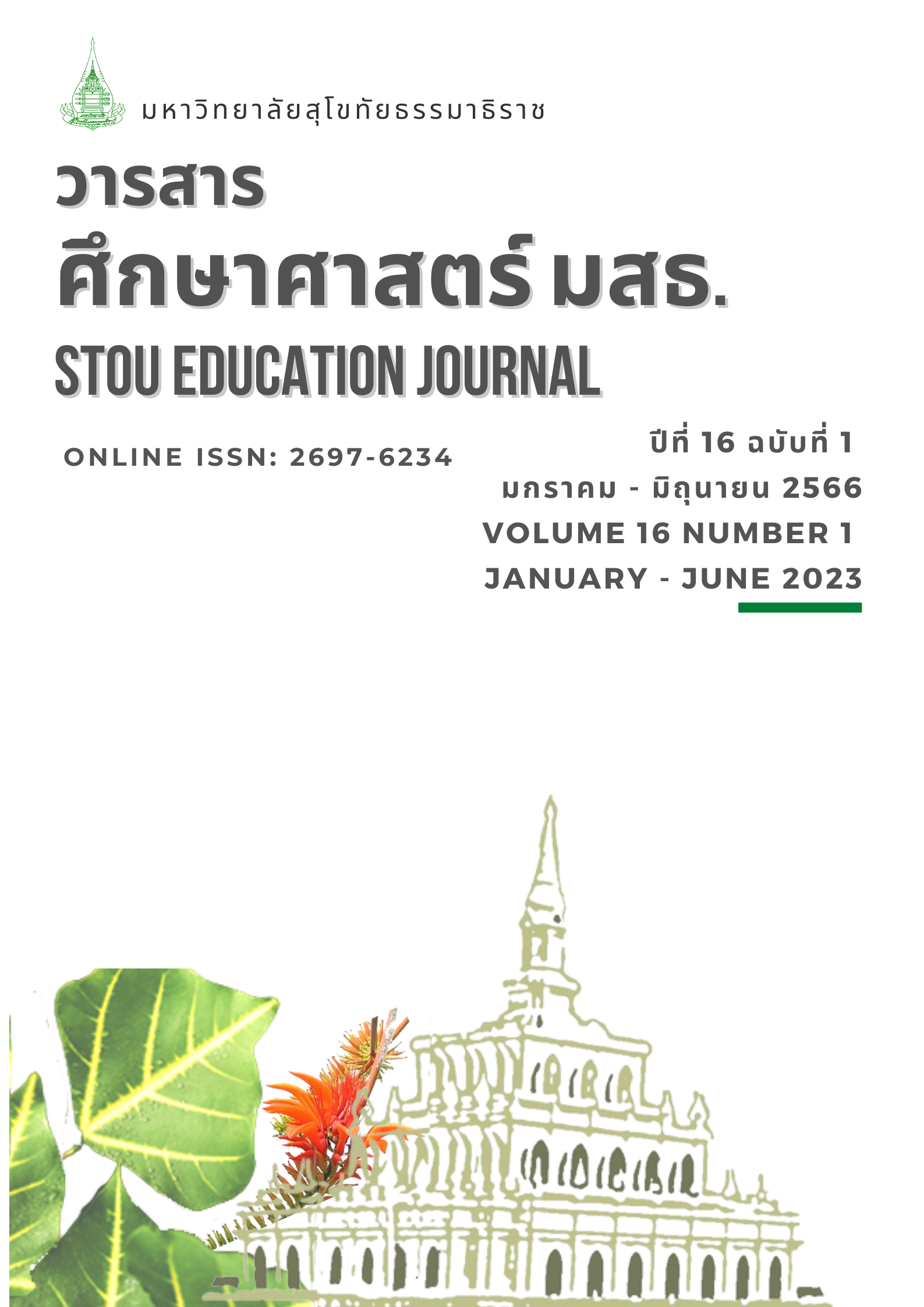The Development of Online Teacher Professional Development Program to Enhance Learning Management Ability in STEM Education of Freshman Science Student Teachers
Main Article Content
Abstract
This research aimed to 1) develop an online teacher professional development program to enhance learning management ability in STEM education of science student teachers, and 2) study the results of experimenting with the program. The participants included 26 freshman science student teachers with no basic knowledge of the teaching profession and science learning management, enrolling in the STEM education course in the academic year 2021. This research and development consisted of 4 phases: 1) studying problems and needs, 2) designing and developing the program,
3) experimenting with the program, and 4) revising the program. The instruments included a STEM education assessment form, a STEM learning management ability assessment form, a semi-structured interview form, a student journal, and a teachers’ reflective journal. The data were analyzed by using descriptive statistics and content analysis. The findings revealed that 1) the program covered the following contents: science learning management connecting to STEM education, designing STEM lesson plans and conducting online microteaching, combining face-to-face teaching with online group activities, and concluding the learning. 2) The results of experimenting with the program found that the student teachers increased their knowledge of STEM education, moreover, their ability to design STEM lesson plans and their online microteaching were rated at a good level.
Article Details
References
กระทรวงการอุดมศึกษา วิทยาศาสตร์ วิจัยและนวัตกรรม. (2564). ประกาศกระทรวงการอุดมศึกษา วิทยาศาสตร์ วิจัยและนวัตกรรม เรื่อง มาตรการการเฝ้าระวังการแพร่ระบาดของโรคติดเชื้อไวรัสโคโรนา 2019 (COVID-19) (ฉบับที่ 17). https://www.mhesi.go.th/images/Pusit2021/pdfs/17-AnnCovid.pdf
จุฬารัตน์ ธรรมประทีป และ ชนิพรรณ จาติเสถียร. (2560). การพัฒนาวิชาชีพครูแบบร่วมมือ เรื่อง STEM สำหรับครูปฐมวัย. วารสารศึกษาศาสตร์ มสธ., 10(2), 35-53.
ฉัตรมงคล สีประสงค์ และ ณมนรัก คำฉัตร. (2564). การพัฒนาแนวคิดวิทยาศาสตร์ เรื่อง การสังเคราะห์ด้วยแสง สำหรับนักศึกษาครูสาขาวิชาชีววิทยา ด้วยการจัดการเรียนรู้แบบ 5B Model ภายใต้สถานการณ์การแพร่ระบาดของโควิด-19. วารสารวิทยาศาสตร์และวิทยาศาสตร์ศึกษา, 4(2), 217-230.
ชุติมา วิชัยดิษฐ์ และ ชาตรี ฝ่ายคำตา. (2560). การสำรวจมุมมองการสอนสะเต็มศึกษาของนิสิตครูวิทยาศาสตร์. วารสารมหาวิทยาลัยราชภัฏมหาสารคาม, 11(3), 165-174.
น้ำเพชร นาสารีย์, รัตนะ บัวสนธ์, ดิเรก ธีระภูธร, และ สายฝน วิบูลรังสรรค์. (2563). การประเมินความต้องการจำเป็นในการพัฒนาการรู้เรื่องการประเมินขอนักศึกษาฝึกประสบการณ์วิชาชีพครูวิทยาศาสตร์. วารสารมหาวิทยาลัยศิลปากร, 40(2), 78-98.
บุญเลี้ยง ทุมทอง และ ประทวน วันนิจ. (2565). ผลกระทบจากสถานการณ์โควิดที่มีต่อการจัดการศึกษาไทย: การศึกษาทางเลือก คือทางหลักและทางรอดในการจัดระบบ การศึกษาไทยในอนาคต. วารสารวิชาการธรรมทรรศน์, 22(4), 375-391.
ปัฐมาภรณ์ พิมพ์ทอง. (2564). การจัดการเรียนรู้สะเต็มศึกษา (พิมพ์ครั้งที่ 2). วิสต้า อินเตอร์ปริ้นท์.
ปริญญา มีสุข. (2552). ผลการออกแบบโปรแกรมการพัฒนาวิชาชีพแบบมีส่วนร่วมของครู. [วิทยานิพนธ์ปริญญาดุษฏีบัณฑิต ไม่ได้ตีพิมพ์]. จุฬาลงกรณ์มหาวิทยาลัย.
นารีรัตน์ รักวิจิตรกุล. (2560). การพัฒนาวิชาชีพครู. วารสารศึกษาศาสตร์ มหาวิทยาลัยมหาสารคาม, 11(1), 21-33.
พินธุดิฐ กลิ่นขจร, นฤมล ยุตาคม, และ ธีระศักดิ์ วีระภาสพงษ์. (2561). ความเข้าใจและการปฏิบัติการสอนตามแนวคิดการศึกษาวิทยาศาสตร์ เทคโนโลยี วิศวกรรมศาสตร์ และคณิตศาสตร์ ของครูฟิสิกส์ในโรงเรียนเตรียมวิศวกรรมศาสตร์. วารสารบัณฑิตศึกษา มหาวิทยาลัยราชภัฏวไลยอลงกรณ์ ในพระบรมชาชูปถัมภ์, 12(2), 146-156.
ลือชา ลดาชาติ. (2558). การวิจัยเชิงคุณภาพสำหรับครูวิทยาศาสตร์. สำนักพิมพ์แห่งจุฬาลงกรณ์มหาวิทยาลัย.
วัชราภรณ์ ประภาสะโนบล, สุธิดา ทองคำ, และ มาเรียม นิลพันธุ์. (2565). การพัฒนาหลักสูตรออนไลน์เพื่อเสริมสร้างสมรรถนะการออกแบบวิธีการวิจัยในชั้นเรียนสำหรับนักศึกษาครู มหาวิทยาลัยราชภัฏเพชรบุรี. วารสารศึกษาศาสตร์ มหาวิทยาลัยนเรศวร, 24(2), 211-221.
วนินทร สุภาพ. (2561). การจัดการเรียนรู้คณิตศาสตร์ตามแนวทางสะเต็มศึกษา: วิธีการ ความหวัง และความท้าทาย. วารสารศึกษาศาสตร์ มหาวิทยาลัยนเรศวร, 20(4), 302-315.
วิภาวรรณ เอกวรรณัง, พิกุล เอกวรางกรู, และ บุญเรียง ขจรศิลป์. (2560). การพัฒนาแบบประเมินสมรรถนะวิชาชีพครูสำหรับนักศึกษาฝึกประสบการณ์วิชาชีพครู มหาวิทยาลัยราชภัฏ. วารสารวิจัยและพัฒนา มหาวิทยาลัยราชภัฏสวนสุนันทา, 9(2), 119-131.
วรชัย วิภูอุปรโค และ ศรเนตร อารีโสภณพิเชฐ. (2565). การจัดการเรียนการสอนออนไลน์ระบบเปิด (MOOC) ที่มีประสิทธิภาพของมหาวิทยาลัยในประเทศไทย. วารสารวิชาการ มหาวิทยาลัยกรุงเทพธนบุรี, 11(2), 47-63.
สุทธิดา จำรัส. (2560). นิยามของสะเต็มและลักษณะสำคัญของกิจกรรมการเรียนรู้ตามแนวสะเต็มศึกษา. วารสารศึกษาศาสตร์ มสธ., 10(2), 13-34.
อาทิตยา จิตร์เอื้อเฟื้อ. (2563). การพัฒนาการรู้สะเต็มของนักศึกษาครูวิทยาศาสตร์ผ่านการมีส่วนร่วมชุมชนผนวกค่ายบูรณาการสะเต็มศึกษาในแหล่งเรียนรู้ท้องถิ่นจังหวัดสุราษฎร์ธานี. วารสารศึกษาศาสตร์ มหาวิทยาลัยนเรศวร, 22(2), 302-316.
Altan, E. B., & Ercan, S. (2016). STEM education program for science teachers: Perceptions and competencies. Journal of Turkish Science Education, 13(Special Issue), 103-117.
Avery, Z. K., & Reeve, E. M. (2013). Developing effective stem professional development programs. Journal of Technology Education, 25(1), 55-69.
Berge, Z. L. (2013). E-Moderating: The key to teaching and learning online. Distance Education, 34(3), 391–405.
Bybee, R. (2013). The case for STEM education: Challenges and opportunities. NSTA Press.
Corbett, T., Dumaresq, C. C., Barnaby, T., & Baumer, C. (2014). The Framework for integrative Science, Technology, Engineering & Mathematics (STEM) education endorsement guidelines. Pennsylvania Department of Education.
Creswel, J. W. (2013). Qualitative inquiry research design: Choosing among five approaches. SAGE Publications.
Doo, M. Y., Tang, Y., Bonk, C. J., & Zhu, M. (2020). MOOC instructormotivation and career development. Distance Education, 41(1), 26–47. https://doi.org/10.1080/01587919.2020.1724770
Faikhamta, C., Lertdechapat K., & Prasoblarb, T. (2020). The impact of a PCK-based professional development program on science teachers’ ability to teaching STEM. Journal of Science and Mathematics Education in Southeast Asia, 43, 1-22.
Guskey, T. R. (2002). Professional development and teacher change. Teachers and Teaching, 8(3), 381-391.
Herro, D., & Quigley, C. (2017). Exploring teachers’ perceptions of steam teaching through professional development: Implications for teacher educators. Professional Development in Education, 43(3), 416-438.
Köroğlu, M., Galiç, S., & Arkün Kocadere, S. (2021). A proposal for an open online course: Preparing teachers for STEAM education. Proceeding book in 8 th Instructional Technologies and Teacher Education Symposium, 297-305.
Loucks-Horsley, S., Love, N. B., Stiles, K. E., Mundry, S. E., & Hewson, P. W. (2010). Designing professional development for teachers of science and mathematics (3rd ed.). Corwin.
National Research Council [NRC]. (2012). A framework for K-12 science education: Practices, crosscutting concept, and core ideas. National Academy Press.
Nadelson, L. S., Seifert, A., Moll, A. J., & Coats, B. (2012). I-STEM summer institute: An integrated approach to teacher professional development in STEM. Journal of STEM Education, 13(2), 69–84.
Philipsen, B., Tondeur, J., Roblin, N. P., & Vanslambrouck, S. (2019). Improving teacher professional development for online and blended learning: A systematic meta-aggregative review. Educational Technology Research and Development, 67, 1145–1174.
Trespalacios, J., & Lowenthal, P. R. (2019). What do they really like? An investigation of students' perceptions of their coursework in a fully online educational technology program. Australasian Journal of Educational Technology, 35(5), 60-78.


